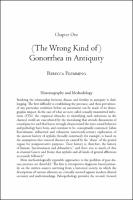Chapter One (The Wrong Kind of ) Gonorrhea in Antiquity
Author(s)
Flemming, Rebecca
Collection
WellcomeLanguage
EnglishAbstract
Studying the relationship between disease and fertility in antiquity is challenging.
The first difficulty is establishing the presence, and then prevalence,
of any particular condition before an assessment can be made of its demographic
impact. In the case of what are now called sexually transmitted infections
(STIs), the empirical obstacles to identifying such infections in the
classical world are exacerbated by the moralizing that attends discussions of
sexual practice and that has so strongly characterized the ways sexual behavior
and pathology have been, and continue to be, conceptually conjoined. Julius
Rosenbaum’s influential and exhaustive nineteenth-century exploration of
the ancient history of syphilis (broadly construed), for example, is based on
the assumption that venereal diseases are caused by the “abuse” of the genital
organs for nonprocreative purposes. Their history is, therefore, the history
of human “lasciviousness and debauchery,” and there was so much of that
in classical Greece and Rome that syphilis and all kinds of genital afflictions
necessarily followed.
Keywords
sexually transmitted infections; fertility; antiquityDOI
10.2307/j.ctvd58rzzOCN
1135848543Publisher
University of Rochester PressPublication date and place
Rochester, 2019Grantor
Classification
History of medicine


 Download
Download